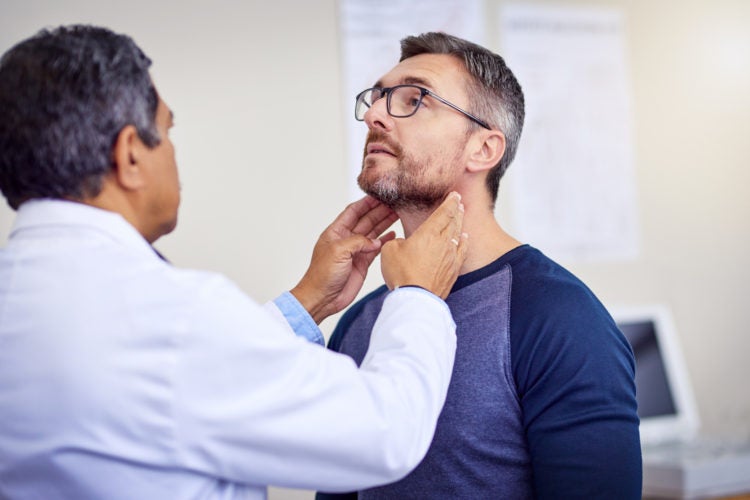-
Common Reasons that Men Change Their Minds About Their Vasectomies

There are plenty of options for birth control, but few of them are permanent. Men may decide to get a vasectomy if they think they’re all done having children, or if they think they never want to have kids. But quite often, guys change their minds. If you’ve been thinking about getting a vasectomy reversal, you’re not alone. Plenty of other men have gone back to the surgeon’s office after changing their mind about having children.
Realizing They Aren’t Done Having Kids
Many men who undergo vasectomy reversals have already had one or more children. When the kids are young and demand a great deal of time and attention, it can be easy to decide that you’ve had enough children. But as the kids grow up and empty nest syndrome sets in, many couples decide they want another chance at parenthood. There are lots of advantages to being an older father. Older dads have more wisdom to pass down. They also have the patience that comes from personally experiencing sleepless nights with an infant and long waits in doctors’ offices with sick kids.
Divorcing and Finding Love Again
Divorce is often perceived as a failure, but perhaps it shouldn’t be. Rather, it’s a chance to start over and an opportunity to find love again. Some men who have previously had a vasectomy later get divorced. When they find a new partner, they might want to have children together.
Suffering from Post-Vasectomy Pain Syndrome
Vasectomies are routine procedures and serious complications aren’t common. But some men develop post-vasectomy pain syndrome (PVPS). PVPS can be chronic and it may be debilitating for some men. A vasectomy doesn’t stop sperm production; it only stops the release of sperm into the ejaculate. It’s thought that PVPS develops as a result of the accumulation of sperm, which exerts pressure on the vas deferens. One way to address PVPS symptoms is to get a vasectomy reversal.
If you’ve changed your mind about your vasectomy, the Center for Vasectomy Reversal invites you to consult Dr. Joshua Green. He is a leading vasectomy reversal surgeon in Sarasota who specializes in male infertility procedures. Call (941) 894-6428. Out-of-towners are welcome.
-
Sperm Retrieval for IVF: What to Expect

After a vasectomy, in some cases, men who want to start a family are better candidates for sperm retrieval than a vasectomy reversal. Sperm retrieval is performed as part of in-vitro fertilization, or IVF. This option is necessary in the case of azoospermia, which means that there is no sperm present in the ejaculate. During sperm retrieval, sperm is removed directly from the epididymis so that it can be used in IVF procedures. If your vasectomy reversal surgeon recommends this procedure, here is what you can expect.
Sperm Retrieval Through MESA
Sperm retrieval is performed using the MESA procedure, or Microscopic Epididymal Sperm Aspiration. It is performed using an operating microscope, so your surgeon can see exactly where sperm is located in the epididymal tubules. Through the use of the operating microscope, it is possible for your surgeon to remove the sperm with as little damage as possible to the surrounding structures and with as little blood and other fluid as possible. This increases the chances of success during IVF.
Local Anesthesia
MESA is usually performed under local anesthesia, though some patients receive spinal blocks or general anesthesia. During the procedure, once you receive the anesthesia that the surgeon deems appropriate for you, he or she will make a series of small incisions in order to access the epididymal tubes. Using the microscope, he or she will remove the sperm from the tubes and frozen for use in future IVF sessions. Generally, it is possible to get enough sperm for multiple rounds of IVF during one MESA procedure.
Recovery
MESA is a minimally invasive procedure, and recovery is usually fast. It’s normal to have some swelling and tenderness for a few days after MESA that is easily controlled with pain medications. Most people return to normal activities within a few days.
MESA is one of the procedures offered at the Center for Vasectomy Reversal in Sarasota. Dr. Green can help you decide if vasectomy reversal or another procedure, such as MESA, is the best fit for you. Schedule an appointment today by calling (941) 894-6428.
-
It’s Been a Long Time Since My Vasectomy. Can I Still Get a Reversal?

Most men who have vasectomies do so because they feel sure that they no longer want to have children. However, life can change in unexpected ways, even long after a vasectomy procedure. If this happens to you, you may be wondering if it has simply been too long since your original procedure to consider a vasectomy reversal. How long is too long to wait to change your mind?
Vasectomy reversals have the highest rates of success when they are performed soon after the original procedure. That doesn’t mean that reversals can’t be successful even decades later. Dr. Green has seen patients have successful reversals more than 20 years after their vasectomies since men produce sperm for their entire lives. If a vasectomy reversal is not possible, sperm retrieval for IVF is another option.
The best way to decide if a vasectomy reversal is right for you is to schedule a consultation with Dr. Green at the Center for Vasectomy Reversal. To learn more about having a vasectomy reversal in Sarasota, call (941) 894-6428 today.
-
Would You Use Social Media to Choose a Baby Name?
Picking a baby name is one of the most exciting parts of growing your family. After a vasectomy reversal, if your partner conceives, would you ever use social media to help pick your baby’s name?
Watch this video to hear how social media is shaping the way that some people pick names for their babies. Some people check social media handles and change the names that they had in mind of their chosen name is already taken, while others conduct social media polls to narrow down a name.
Are you ready to start picking baby names? Call the Center for Vasectomy Reversal and learn more about vasectomy reversal procedures with Dr. Green in Sarasota. For more information, call (941) 894-6428.
-
Caring for Yourself at Home After Your Vasectomy Reversal

Vasectomy reversals are generally well-tolerated procedures. In most cases, patients return home on the same day as their surgeries and recover over the course of the next few weeks. Before you leave the surgery center, you will receive detailed instructions on how to care for yourself at home and avoid complications. Here is what you need to know.
Anesthesia Recovery
Before your surgery, your doctor will decide what kind of anesthesia is right for you. Some patients have the procedure using local anesthesia or a spinal block along with a sedative to prevent them from moving during the surgery. Others undergo vasectomy reversals with general anesthesia. After the procedure, you may still feel some of the effects of the anesthesia when you leave the surgery center, including numbness, dizziness, fatigue, and nausea. This is normal and will gradually ease. Most people feel like they have fully recovered from anesthesia after 24 hours.
Surgical Site Care
After the surgery, you will have two small drains in your scrotum. These will be removed the day after the surgery. You will need to wear supportive underwear or an athletic supporter continuously for about a month after your surgery, which will give you the appropriate amount of support as you heal. The incision itself should heal within about two weeks, and the stitches will be absorbed, so they do not need to be removed.
Return to Normal Activities
Most people are able to return to work within a week of their surgeries, but it is recommended that you refrain from heavy lifting or sexual intercourse for about four weeks after your procedure. Most men say that the recovery process from their vasectomy reversals is similar to the recovery from their original vasectomy procedures.
At the Center for Vasectomy Reversal, our team will support you both before and after your surgery, so you have the healthiest, most comfortable recovery possible. Are you considering a vasectomy reversal? Call Dr. Green in Sarasota at (941) 894-6428.
-
A Surgery Preparation Guide for Out-of-Town Patients

It’s more common than you might think for patients to travel for surgery, particularly when the surgery is a very delicate procedure like a vasectomy reversal. It’s important to choose a vasectomy reversal surgeon who has an excellent track record of success and plenty of experience in the various surgical approaches. Patients often decide that the skill of the surgeon is more important than the distance.
Coordinate the scheduling with your partner.
You must be accompanied by a responsible adult when you leave the surgical center. Because of this, you and your partner will both need to travel for the surgery. Ask the surgeon’s office about the available surgery dates, and coordinate with your partner to pick the best one.
Pack comfortable clothing.
After having any surgery, comfort will likely be your top priority. Pack an assortment of comfortable clothing that is easy to put on and take off. You’ll be resting in your hotel room after the surgery, so consider bringing sweatpants and a robe. Remember that you’ll also need to wear a jock strap for a while after the surgery to minimize swelling and support the surgical area.
Choose a hotel with room service.
If you were planning a typical vacation, you’d probably research good restaurants in the area. But for a trip for surgery, it’s more convenient to order room service. When booking your hotel, you should check out the room service menus and policies in advance, such as how late you can order. Remember that you’ll need to refrain from eating and drinking anything prior to surgery. Typically, patients are asked to fast beginning at midnight the night before.
Thanks to Dr. Joshua Green’s renowned expertise, patients travel from far and wide to undergo medical procedures at the Center for Vasectomy Reversal. Our office makes it as easy as possible for our out-of-town patients to complete many of the pre-operative necessities before they arrive in Sarasota for a vasectomy reversal. If you have questions about traveling for surgery, we’ll be happy to help you at (941) 894-6428.
-
Will You Need Pre-Surgery Testing?

Before you have any type of surgery, including a vasectomy reversal, it’s crucial to inform the doctor of your full medical history. The vasectomy reversal surgeon needs to know about your pre-existing medical conditions, prior history of surgeries, and the medications and supplements you may be taking, including over-the-counter (OTC) drugs. In some cases, patients may be asked to undergo pre-surgery medical testing.
It’s particularly important to inform the doctor if you take medications for high blood pressure. The surgeon may need you to have a simple blood test. And if you are in poor overall health, you may need to see your primary physician in order to get medically cleared for surgery. Medical clearance means that it’s generally safe for you to undergo surgery, despite the presence of medical conditions.
Receive the personalized guidance and medical advice you need when you become a patient at the Center for Vasectomy Reversal in Sarasota. Call (941) 894-6428 to request an appointment with Dr. Green.
-
Re-Do Vasectomy Reversal Surgeries: What You Need to Know

Vasectomy reversals are performed to reconnect the vas deferens and make pregnancy possible after men have had vasectomies. Vasectomy reversals have a high rate of success, as defined by the presence of sperm in the semen within 12 months of the procedure. However, some men do experience failed vasectomy reversals, which may lead them to consider getting a re-do procedure. You may be a good candidate for a re-do operation, but only a vasectomy reversal surgeon can determine this.
What Causes Failed Vasectomy Reversals
There are a number of possible causes for a failed reversal. One potential reason is that scar tissue has built up at the surgical site. The body naturally produces scar tissue as part of the healing response. When there is too much scar tissue around the vas deferens, it can block the sperm from passing through this narrow tube. During a re-do procedure, the surgeon can remove the scar tissue. Other possibilities to consider include:
- Surgical site infection
- Post-surgical trauma in the scrotal area
- Presence of anti-sperm antibodies
- Improper use of the vasovasostomy instead of another surgical technique
What Other Factors Contribute to Infertility
A failed vasectomy reversal can be defined in two main ways: The failure of the sperm to travel through the vas deferens, or the failure to conceive a child naturally. In other words, even if the original procedure did result in the presence of sperm in the semen, there may be other underlying issues causing male or female infertility. Before considering a re-do reversal, it’s advisable for you and your partner to undergo a medical evaluation to assess fertility.
Why You Might Consider Sperm Aspiration
Even if the vasectomy reversal surgeon determines that a re-do procedure isn’t likely to succeed, you do have another option for having biological children. The surgeon can aspirate sperm from the epididymis. This is known as the MESA procedure. You and your partner may then decide to use the sperm for an in vitro fertilization (IVF) cycle.
Dr. Joshua Green has considerable expertise in re-do vasectomy reversals and has performed many of them successfully. Every patient has unique circumstances to consider, and so you should consult Dr. Green in Sarasota directly to find out if a repeat reversal might be right for you. Call the Center for Vasectomy Reversal at (941) 894-6428 to request a consult.
-
Understanding the Vasectomy Reversal Procedure
The vasectomy reversal is a highly delicate, complex procedure. The goal is to reconnect the vas deferens, which is the tiny tube that carries sperm from the testicle to the semen. This can enable a couple to get pregnant. The vas deferens is about one-third of a millimeter in diameter. The surgeon places several tiny stitches around that tube to reconnect the severed ends.
You can learn more about vasectomy reversals by watching the accompanying video clip of “The Doctors” TV show. It features a couple who underwent the procedure and their vasectomy reversal surgeon. You’ll hear about success rates, semen analysis, and other options, such as IVF.
Dr. Joshua Green at the Center for Vasectomy Reversal looks forward to meeting you and your partner. Call (941) 894-6428 to begin the process of exploring infertility procedures available in Sarasota.
-
Are You a Candidate for a V-E Procedure?

During your consult, your vasectomy reversal surgeon will explain your surgical options. Depending on your unique situation, you may be a candidate for a vasoepididymostomy, also called the V-E procedure. If so, the surgeon will attach the vas deferens directly to the epididymis, which is the small organ at the rear of each testicle that stores the sperm. The V-E technique is far more technically complicated than the standard vasovasostomy. However, you may require the V-E approach if you aren’t a good candidate for a vasovasostomy.
It’s typical for the vasectomy reversal surgeon to determine which technique is right for you during the surgery itself. The determining factor is whether there is sperm present in the fluid in the vas deferens. It’s not common to require the V-E procedure when a man has the reversal performed within 10 years of having the original vasectomy procedure.
At the Center for Vasectomy Reversal, Dr. Joshua Green will answer all of your questions about the surgery before you make your decision. Call (941) 894-6428 to request a consultation for having a vasectomy reversal in Sarasota.
Recent Posts
Popular Posts
categories
- Uncategorized
- Sperm Retrieval
- vasectomy reversal
- Emergency
- Dr. Green
- sperm count
- fertility
- male infertility
- MESA
- medical care
- low sperm count
- IVF
- male fertility testing
- anesthesia
- pregnancy
- sperm aspiration
- semen analysis
- post-vasectomy pain syndrome
- infertility
- VE
- anti-sperm antibodies
- older dad
- general anesthesia
- gender reveal party
- post-operative infections
- baby name
- parent
- baby's first year
- fertilization process
- spinal anesthesia
- ACS Fellow
- nutrition tips
- concierge-level care
- fertility planning app
- azoospermia
- out-of-town patients
- V-V
- post-vasectomy reversal
- conceiving
- vasectomy
- vasoepididymostomy
- smoking
- sperm quality
- baby registry
- infographic
- surgical care
- surgical consultation process
- prostate cancer
- baby gender
- family time
- COVID
- Baby Shower
- Child Care
- Halloween Costume Ideas for Babies
- Halloween
- Halloween Safety Tips
- Celebrity Infertility Spotlight
- Postpartum
- testosterone
- Father's Day
- Father
- Men's Health
- Thanksgiving
- Pregnancy Announcement
- Parenting Tips
- Sperm
